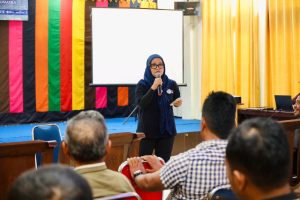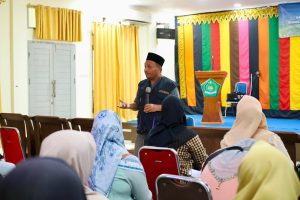UNAIR NEWS – Iguana is a reptile native to South American countries. Because of similarity in climate and weather, breeding iguana in Indonesia is possible to do. As a hobby or scientific study, iguana can also be bred in campus.
Fajar Dany Prabayudha, drh., is one of the initiators in breeding iguanas (Iguana iguana) in Faculty of Veterinary Medicine (FKH) Universitas Airlangga (UNAIR). At the moment, FKH UNAIR has 11 adult iguanas, 8 young iguanas and 11 eggs of iguanas. Five of them belong to the faculty and 6 of them are students’. The young ones are shared evenly among the owners.
“Iguana’s reproduction cycle is not so difficult to understand. In Indonesia, a year they can be bred twice. After the cages officially used in January 2016, three females laid eggs on March 21 2016 and hatched on June 15 2016,” said Fajar.
The iguana’s breeding was done because of students’ suggestions who are interested in reptiles, either in the university or outside campus. They shared a dream, to built a mini-zoo in campus.
When the Newsroom crew made a visit to the 4.5m x 4.5m cage in FKH UNAIR, there were 11 adult iguanas in the trees and once in a while blinking their saggy eyes. In the cage there were also some trees, grass and puddles.

“Iguana need a proper place to exercise, wallow or sandy ground to lay eggs, There should be branches for them to climb as the feel comfortable when they are higher on branches,” said Fajar.
In FKH, there are two species bred, green and red iguana. But the young ones are separated from their parents. “The offsprings are separated. In case the male was too dominant, they will be bit and hunted,” said Fajar.
Involving Students
To look after the iguanas, Fajar and some students taking turns in feeding the herbivores. “Because it was from students and for students, the food was also from students. For example, on Monday and Tuesday, 2013 students feed them. On Wednesday and Thursday, 2014 students have their turn. So every day they have contacts with students,” said Fajar who is currently taking his specialist program.
Because they are herbivores, students feed them with vegetables like water spinach, cabbage, and bean sprouts. An iguana needs at least 20 bunches of water spinach, bean sprouts worth Rp 5 thousand to 10 thousand. Sometimes they give them carrots. The feeding is done once a day.
Every day, iguanas need to sunbathe. The bigger the iguana, the longer it sunbathe. One iguana to another has different duration of sunbathing, depends on their need and metabolism. In FKH, because the cage is located outdoor, the iguanas can adjust to their own need.
Fajar said that, there is no difficulties in breeding the iguanas. In his opinion, iguanas are fast to adapt with human and iguanas bred in FKH are not the closest relative to iguanas native to South America.

“They are from the Indonesian breeding. So, they are not originally from South America. The South American natives might bite,” said Fajar.
The iguanas’ existence in campus were used for the students’ study. They can observe the reproduction cycle, mating season, or when they are sick. Students who have practical research can take samples from the iguanas bred in campus.
Fajar also said two things for breeders outside the campus. First, make time. He said that the owners have to spare their time to take care of the iguanas. “Have to make time because they sunbathe from the morning to afternoon,” advised Fajar.
The second thing is the cage. “Don’t buy iguana first if there is no cage yet. Iguana is easy to look after, not as complicated as the other animals,” said Fajar.
Author: Defrina Sukma S.
Editor : Dilan Salsabila










